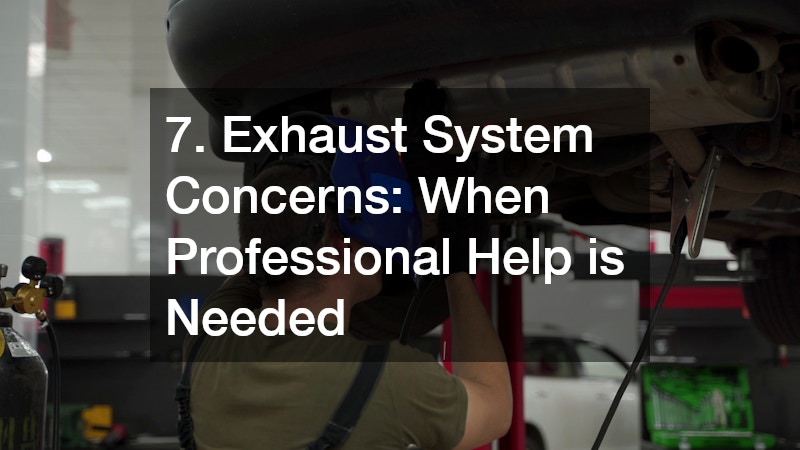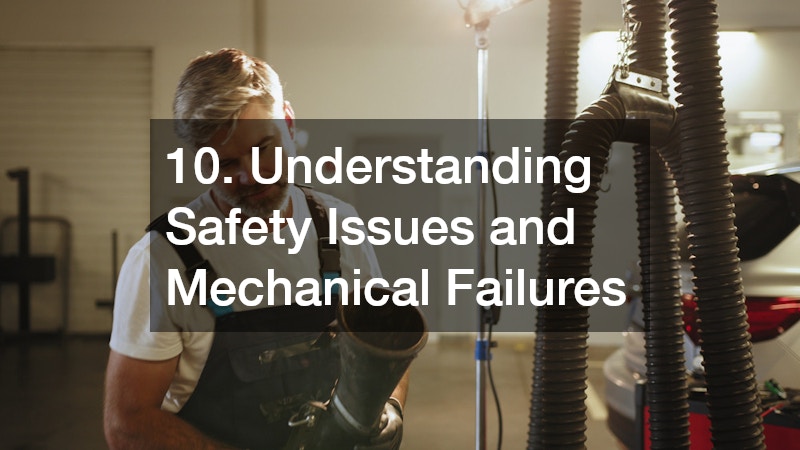When to Call a Mechanic Different Repairs for Various Vehicles

Understanding when to handle vehicle repairs on your own and when to call a mechanic can save you time, money, and ensure the longevity of your car. Many vehicle owners often face minor issues that they might think can be fixed easily without professional help. However, distinguishing between tasks you can DIY and those that necessitate professional skills is crucial. This article explores common auto repair conundrums and guides readers on when professional help is advised. Simple maintenance tasks such as checking and topping off fluids, replacing windshield wipers, or changing air filters are often manageable for most vehicle owners. These tasks usually require minimal tools and a basic understanding of your vehicle’s layout. For example, changing your oil or replacing spark plugs might be within reach if you have the right equipment and some prior experience. Performing these routine maintenance tasks yourself can reduce costs and keep your vehicle running smoothly between professional visits.
However, there are certain repairs that are best left to professionals. Problems involving the engine, transmission, or electrical systems often require specialized diagnostic equipment and advanced expertise. Attempting to fix these issues without the proper knowledge could lead to further damage and costly repairs down the line. For instance, a check engine light can indicate a wide range of issues, some of which are simple while others are more severe. Visiting a trusted mechanic ensures the problem is accurately diagnosed and correctly repaired. Safety-related repairs also demand professional attention. Brakes, steering components, and suspension systems are critical for your vehicle’s safe operation. If you notice symptoms like squeaking brakes, pulling to one side, or uneven tire wear, it is advisable to seek professional inspection immediately. These components involve precise calibration and replacement techniques that are crucial for maintaining control and preventing accidents.
Another consideration is the availability of proper tools and workspace. Many auto repairs require lifts, specialized tools, or diagnostic devices that the average vehicle owner may not have. Professionals work in equipped garages that facilitate efficient and safe repair work, reducing the risk of injury or improper repairs. Finally, warranty and insurance factors should be considered. DIY repairs might void warranties or insurance claims if not conducted according to the manufacturer’s guidelines. Consulting a mechanic can help protect your coverage and avoid potential legal or financial complications. In summary, understanding your skill level, the complexity of the repair, and the safety implications is key to deciding whether to fix your vehicle yourself or call a professional. Being proactive about maintenance and knowing when to seek expert help can save money and keep your car reliable for years to come.
1. How to Know When Car Troubles Require a Mechanic

Sometimes, minor issues like a small crack in the windshield can tempt you to opt for local auto glass repairs. While these might seem straightforward, doing it yourself without proper tools can lead to further damage. Consider the complexity of the task and your skills before deciding to repair it solo.
Evaluating the importance of each repair can help you decide when to call a mechanic. If you encounter unusual noises, poor performance, or warning lights, it might be best to seek professional advice. Mechanics are trained and equipped to accurately diagnose issues that might not be evident to the untrained eye.
Learning when to reach out for expert help ensures that more significant problems don’t arise later. Professional diagnosis and repair prevent escalating costs and enhance the safety of your vehicle. Ultimately, understanding your limits is vital in vehicle maintenance.
2. When to Call a Mechanic for Engine Troubles
The engine is the heart of your vehicle, and issues here should never be ignored. One common problem is the driveshaft, which, if damaged, can cause disappointing performance or complete engine failure. Driveshaft repair service requires precise handling, making it a task for experts.
Recognizing early signs like strange noises or difficulty in turning the vehicle might prompt you to call a mechanic. Engine repairs can be complex and time-consuming, requiring the right expertise and technology. Attempting such repairs on your own can sometimes create more significant issues.
When you call a mechanic for engine troubles, you ensure your engine’s longevity and reliability. Whether minor or major issues, professional assessment can clarify the extent of damage and necessary interventions. This approach saves time and guarantees your engine remains in top-notch condition.
3. Dealing with Electrical System Issues in Your Vehicle
The electrical system in vehicles today is intricate and essential for various functionalities, including navigation and entertainment systems. Problems that seem minor as flickering lights, might require more in-depth examinations like local transmission repair. These are best diagnosed by professionals.
Choosing to call a mechanic for electrical issues ensures precision and safety in repairs. The risks of DIY electrical repairs include short-circuiting or further system malfunctions, making professional help invaluable. Proper diagnosis leads to effective solutions, preserving the vehicle’s integrity.
Mechanics with expertise in vehicle electrical systems provide comprehensive solutions, ensuring optimal performance. Their knowledge and equipment allow them to address issues accurately. Trusting your vehicle to skilled hands ensures better outcomes than quick fixes.
4. Brake Problems: When is it Essential to Call a Mechanic?

Brakes are crucial for safety, making it vital to address any issues immediately. While it may be tempting to do local mobile trailer repair or similar small brake adjustments, the consequences of poor repairs are dire. Delays in proper repairs compromise your safety on the road.
If you notice unresponsive brakes or hear squealing noises, it’s wise to call a mechanic. Correct assessment and repair ensure the brakes function optimally. Specialist knowledge about brake systems ensures that detailed aspects are covered, mitigating risks.
Professional mechanics can identify the root cause of brake problems, providing long-lasting solutions. Their experience with similar issues ensures better accuracy and efficiency in repairs. By seeking expert help, you ensure that brake problems no longer pose threats to safe driving.
5. Transmission Troubles: When Intervention is Necessary
Transmission is another crucial vehicle component requiring careful attention and management. Acura repair services, often needed by owners of this brand, highlight the typical challenges associated with transmissions. It’s complex, and a small DIY mistake here can lead to hefty future expenses.
When you experience gear slipping, shaking, or strange noises, it’s imperative to call a mechanic. They have the tools and knowledge to correctly diagnose and fix transmission issues. Professional services prevent unforeseen breakdowns and extended damage.
By using expert services, such as an auto repair service, you ensure a comprehensive understanding of transmission troubles. Experienced mechanics offer solid solutions, maintaining the effectiveness and lifespan of your transmission system. Early intervention by professionals is always the wisest option.
6. When to Call a Mechanic for Suspension or Steering Issues
Suspension and steering problems affect vehicle handling, posing serious safety risks. If you notice a bouncy ride or steering difficulties, these require immediate attention, often best addressed by an auto repair service. Professional handling ensures vehicle stability and control.
Choosing to call a mechanic for suspension or steering issues brings efficiency and accuracy to the repair process. Suspension systems are intricate, involving various components only comprehensible with expert knowledge. Skilled professionals handle these issues with precision.
Proper repair and maintenance by qualified mechanics enhance vehicle performance and safety. Their expertise ensures that each component is correctly adjusted and functional. Relying on them for such critical issues is a prudent decision.
7. Exhaust System Concerns: When Professional Help is Needed

Your vehicle’s exhaust system plays a vital role in managing emissions and ensuring a smooth drive. Sometimes symptoms like unusual smoke or increased engine noise require attention from an auto electric service. Handling repairs with expertise can effectively address these issues.
Calling a mechanic for exhaust problems ensures thorough inspections and solutions. Poorly handled repairs might lead to fines and ineffective emission controls. Professional services offer the confidence of compliance with environmental regulations.
Trained mechanics can replace faulty components and improve exhaust efficiency. They address root causes rather than just symptoms, ensuring your vehicle remains reliable. Their expertise can save time and cost, ultimately enhancing your driving experience.
8. Cooling System Failures: Knowing When to Seek Help
Cooling system failures lead to overheating, risking engine damage and loss of essential fluids. This is not a task to tackle alone without proper understanding; instead, rely on experts for fixes, similar to having brakes professionally maintained. Expertise offers detailed solutions that prevent future issues.
Spotting frequent temperature spikes, steam, or coolant leaks is a sign to call a mechanic. They ensure the cooling system operates seamlessly, maintaining the engine’s performance. Immediate attention by professionals prevents long-term damage.
With professional insight into cooling systems, mechanics offer tailored solutions to complex problems. Comprehensive repairs by experts guarantee durability, saving costs in replacements or extensive repairs. Trusting professionals ensures your cooling system remains reliable.
9. Tire Problems: When to Call a Mechanic for Assistance
Tires form the foundation of safe vehicle operation, and issues here can’t be ignored. BMW repairs, for instance, require special expertise, which is best sought from a trained mechanic. Vehicle stability relies on correctly maintained tires, necessitating professional assistance.
Signs like uneven tire wear, punctures, or air loss should prompt you to call a mechanic. They deliver thorough assessments and decide suitable actions, maintaining safety and performance. Professional tire services prevent additional problems, ensuring vehicle preparedness.
Experienced mechanics can recommend the right tires and the replacement or repair needs. Trusting their advice and skills ensures enhanced vehicle handling and longevity. Their services are essential for drivers seeking effective maintenance and reliability.
10. Understanding Safety Issues and Mechanical Failures

Vehicle safety and mechanical reliability go hand in hand, each demanding attention and care. While basic tasks like an oil change might seem manageable, comprehensive inspections by a professional provide long-term solutions. It’s wise to call a mechanic for key insights that lead to safer driving conditions.
When mechanical failures seem imminent, professional diagnostic services are invaluable. Qualified mechanics identify failing components before they lead to serious issues. Their prompt intervention saves costs and guarantees safety.
Professional mechanics offer advice and comprehensive checks that support vehicle integrity. Their expertise in identifying minor issues before they escalate preserves both cost and security. Call a mechanic to ensure a safe and smooth driving journey.
Knowing When to Call a Mechanic
Vehicle maintenance and repair can often be handled with a basic understanding of automotive basics; however, knowing when to call a mechanic will prevent further damage and ensure your safety on the road. Professional mechanics offer the assurance of correct diagnosis and effective solutions, preserving both your vehicle’s performance and your safety. With insights from this guide, you can confidently make that decision. Recognizing the signs that necessitate professional expertise can save unnecessary hassle and expense, while also optimizing vehicle performance. This knowledge allows you to strike the right balance between DIY maintenance and skilled intervention, giving you peace of mind on the road.
Some key indicators that require immediate professional attention include unusual noises, persistent warning lights, and changes in handling or braking performance. For example, grinding noises when braking or vibrations while steering are clear signals that a mechanic should inspect your vehicle promptly. Ignoring these warning signs can result in costly repairs or compromise your safety. Routine checks like tire pressure, oil levels, and fluid top-offs are manageable tasks that contribute significantly to your vehicle’s health. However, when issues involve complex systems such as the transmission, engine electronics, or air conditioning, it is wise to seek professional services. Modern vehicles increasingly rely on sophisticated computer systems to monitor and regulate performance, making specialized diagnostic equipment essential.
Additionally, mechanics are trained to spot potential problems before they become serious, offering preventive maintenance that extends your vehicle’s lifespan. Regular professional inspections help identify worn belts, leaks, or other hidden issues that DIY checks might miss. Ultimately, combining your efforts with professional expertise results in optimal care for your vehicle. Understanding your limits and recognizing the benefits of professional mechanics will help you maintain a reliable, safe, and well-performing car for years to come.


